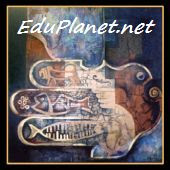What is a Midrash?
taken from http://www.faqs.org/faqs/judaism/FAQ/03-Torah-Halacha/section-25.html
Answer:
Dr. Jacob Neusner explains that the word 'Midrash' is based on a Hebrew word meaning 'interpretation' or 'exegesis'. He shows that the term 'Midrash' has three main usages:
1. The term 'Midrash' can refer to a particular way of reading and interpreting a biblical verse. Thus we may say that the ancient rabbis provided Midrash to Scripture. This does not mean that any interpretation of scripture is automatically true rabbinical Midrash. In fact, most of what people call 'Modern Midrash' has nothing to do with the classical modes of literary exegesis that guided the rabbis. Commentary and Midrash are two different things! In order to get a good idea of what classical rabbinic Midrash really is, one has to actually study it; No two or three sentence definition can accurately define the structure of Midrash.
2. The term 'Midrash' can refer to a book - a compilation of Midrashic teachings. Thus one can say that "Genesis Rabbah" is a book that is a compilation of Midrash readings on the book of Genesis.
3. The term 'Midrash' can refer to a particular verse and its interpretation. Thus one can say that "The Midrash on the verse Genesis 1:1 says that...[and some Midrashic interpretation of the verse would go here].
Dr. Charles T. Davis (Appalachian Statue University, Philosophy and Religion Department, NC) has prepared a [5]summary of the definition and features of Midrash, based on Rabbi Burton Visotzky's "Reading the Bible". This summary says that once a canon (i.e., approved scriptural text) is closed, the problem facing the community is the problem of "searching out" the canon. Midrash is a method of reading the Bible as an Eternal text, and is the result of applying a set of hermeneutical principles evolved by the community to guide one in reading the canon, in order to focus one's reading. The ultimate goal of midrash is to "search out" the fullness of what was spoken by the Divine Voice.
In developing midrash, there are two schools of thought on how to handle the language of Torah. One is that the language is the language of human discourse, and is subject to the same redundancies and occasional verbiage that we all encounter in desultory conversation.
The other view holds that since Scripture is the Word of G@d, no word is superfluous. Every repetition, every apparent mistake, every peculiar feature of arrangement or order has meaning.
Midrash minimizes the authority of the wording of the text as communication, normal language. It places the focus on the reader and the personal struggle of the reader to reach an acceptable moral application of the text. While it is always governed by the wording of the text, it allows for the reader to project his or her inner struggle into the text. This allows for some very powerful and moving interpretations which, to the ordinary user of language, seem to have very little connection with the text. The great weakness of this method is that it always threatens to replace the text with an outpouring of personal reflection. At its best it requires the presence of mystical insight not given to all readers.
Additional reading on Midrash may be found in the [6]Midrash Reading List.

No comments:
Post a Comment